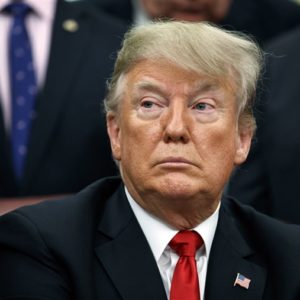The imperious presidency of Donald J. Trump has assaulted the rule of law in America from every angle. Overshadowed by Russian meddling and political interference with law enforcement, Trump’s flagrant quest to profit from his office has received insufficient scrutiny.
The recent flurry of examples are startling, if no longer surprising. The Air Force permitted airmen to lodge at Trump’s Turnberry Golf resort while refueling in Scotland. The vice president decided to stay at Trump’s Irish golf resort while on a state visit to Dublin — on the other side of the country from Trump’s property. And, of course, Trump demanded that the next G7 meeting be held at his financially troubled Doral resort in Miami. These are all just from the last few weeks.
Federal regulations expressly prohibit any federal “employee” from using his or her public office for private gain, but no such law is applicable to the president of the United States. As we learned from the Mueller Report, the Constitution provides substantial legal protections for a president ostensibly wielding Article II powers.
The Emoluments Clause of the Constitution, while applicable to presidents, does not prohibit domestic profiteering. It only precludes a president from profiting from any foreign “king, prince or foreign state.”
In other words, there is no legal prohibition of a president profiting from his office, so long as the source of that profit is his fellow citizens (through their taxes) and not foreigners. The president can do legally what any other federal employee would be prosecuted for even trying.
With existing federal law regulating employee conduct as a guide, the president’s conduct could easily qualify as a “high crime and misdemeanor” worthy of its own impeachment inquiry. But, of course, there remains little political appetite outside the House Judiciary Committee for such a step.
But impeachment may not be necessary to enforce the rule of law. There may be another way.
Within the U.S. attorney’s office for the Southern District of New York sits a file titled United States v. Michael Cohen. That case includes the infamous payments of hush money to adult film star Stormy Daniels in violation of federal campaign finance laws (among other examples of Cohen’s confessed criminal conduct).
The Cohen indictment famously named “Individual 1,” clearly Donald J. Trump, as an unindicted co-conspirator.
The case is poised for immediate prosecution once Trump loses the legal shield of the presidency.
Whether Trump is prosecuted for his alleged crime(s) when he leaves office becomes vital for both the rule of law in America, as well as to ensure that an imperious president does not create an imperial presidency.
President Richard Nixon escaped prosecution for his criminal conduct in Watergate only because of President Gerald Ford’s pardon. Whether Trump’s successor, whenever that may come, will choose to offer a similar pardon (or Trump decides to pardon himself) probably depends on the outcome of the next election.
However, the decision within the Southern District of New York to proceed with the prosecution of Trump once he leaves office must be a certainty. This prosecutorial decision will become the greatest test of America’s most fundamental value: “No man is above the law.”
Prosecuting Trump for his involvement, if not design, of the hush-money payment will serve as a representative prosecution for all of the graft and self-dealing that has pervaded Trump’s term in office.
If Ford’s pardon of Nixon was arguably necessary to move the nation beyond Watergate, then the prosecution of Trump at the conclusion of his presidency is equally necessary to ensure this nation remains one of laws and not the whims of imperious men.

